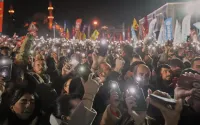October 29, 2002The Guardian
Democracy in Brazil both won and lost on Sunday night. It won because, for the first time in its history, the nation chose a man of humble origins and radical views to be its president. It lost because that man is now forbidden to be radical. The strictures imposed by the capital markets and the International Monetary Fund prevent him from intervening in the economy or commissioning the new social spending so desperately needed by the poor. Instead, he must follow the economic model to which all governments must adhere: a model that subordinates democracy to the free market.
This, at any rate, is the story the world is telling itself, and the story which all those of us who are unhappy with the way the world is run have endlessly reiterated. Over the past few months I have begun to see that it is, in one respect, quite wrong. There is not a single economic model, universally applied. There are two models. One of them is the market fundamentalism to which the poor nations have been forced to submit. The other way is the rich world.
In order to achieve access to the markets of other nations, rich countries have to be seen to have opened up their economies, to have reduced or eliminated subsidies and removed the protective measures that could bestow unfair advantages upon their own industries. This is what the rich world's governments claim to have been doing. Our mistake is to have believed them.
The continuing subsidies for farming in Europe and for farming and steel in the United States - defended by France and Germany last week - are generally seen as anomalous interventions in a market that is otherwise mostly free. But while both Europe and the US have been blatantly picking losers, they have also been quietly picking winners, with devastating consequences for the rest of the world.
For several years, critics of Britain's private finance initiative have been puzzled by its extraordinary resilience. Study after study has shown that it offers worse value for money than conventional public funding. The scheme commands less public support than Mrs Thatcher's poll tax. It threatens to destroy this government's reputation for economic prudence. So why has it still not been abandoned?
The PFI certainly keeps a very powerful corporate constituency quiet, while allowing the government to defer today's spending to future generations. But there is a third factor, which nearly all of us have overlooked. The private finance initiative is turning into one of the United Kingdom's biggest export industries. If the government were to drop it, it would instantly destroy a vast and growing source of revenue. Both the development and the continued existence of PFI in Britain can be interpreted as a massive export promotion scheme.
In March 1996, the chancellor of the exchequer, Kenneth Clarke, travelled to South Africa with a group of bankers and consultants. Mr Clarke explained to his hosts that in Britain the private finance initiative was "maximising efficiency" and striking "the best balance between cost, design and effective operation". Coming just five months after the completion of the first PFI project commissioned in the UK - the Skye Bridge - which was already emerging as the biggest failure in government procurement since the Poulson scandal of the 1960s and 1970s, this was breathtaking chutzpah. But his audience knew nothing of this and similar scandals. Mr Clarke explained that "the full spectrum of techniques" had been "tried and tested in the UK". The private finance initiative was now ready to be exported to South Africa.
Soon after the Labour government came to power, a delegation of civil servants from South African health authorities were given what appears to have been a highly selective tour of British PFI projects. This was followed by the biggest healthcare trade mission the British government has ever organised. Two years ago, South Africa started signing the first contracts for PFI hospital schemes. Many of the contractors, unsurprisingly, are the companies that have "tried and tested" the model in Britain.
The government has been careful to ensure that South Africa does not find out that it has fallen for a monumental confidence trick. At the end of last year, for example, Stephen Timms, financial secretary to the Treasury, travelled to Cape Town, where he cited "independent research" showing that PFI was, on average, 17% cheaper than public procurement. The "independent research" was actually a study commissioned by the government, whose findings, wildly distorted by the terms of reference the consultants were given, have been ridiculed over here.
But, with the help of such selective accounts, at least 13 other governments have been persuaded to adopt the British model of procurement. Once they have taken the bait, British companies have been the first to offer their services. The first projects in Ireland's massive PFI programme for schools, for example, have been snaffled by Jarvis and Barclays Bank. Warsaw's £2bn Underground project, described by consultants as the "template for infrastructure investment across Poland" is being developed by a British consortium. Holland's first big PFI scheme, the high-speed rail link connecting Amsterdam to Rotterdam and Belgium, is buzzing with British lawyers, consultants and financiers. Last year, the Royal Bank of Scotland estimated that the global PFI market for infrastructure projects alone would be worth £25bn by 2006. Britain's disaster is being exported worldwide.
All this could be viewed as a triumph for Britain's export promotion policies. It could also be seen as an extraordinarily ambitious intervention in the market.
The PFI industry in the UK has been developed entirely at public expense. Several different models have been tried, often with catastrophic consequences, allowing the corporations to discover which ones are profitable and politically viable. British people are the guinea pigs upon whom the models have been tested.
By the time the scheme was ready for export, it was obvious that it wasn't working, but if the government dropped it at home, it could never be sold abroad. At least part of the £23bn committed so far - and the £64bn still planned - is a vast but hidden export subsidy for a developing industry.
When one considers the new intellectual property rights regimes designed to protect companies in the rich world, the subsidies for oil, gas, the nuclear industry, biotechnology and drugs companies, the government support for the defence, transport and farming industries, the relocation grants and regional assistance, one begins to wonder whether there is a single sector of the rich world's economy which does not receive massive help from the state.
There is an argument for government intervention in poor nations: all the countries which are wealthy today supported their industries during the development phase. There is no viable argument for government intervention in rich nations. Yet the very countries that need it least are those which appear to use it universally, while those which may need it most are told that unless they open and expose their markets, they must lose their credit ratings and contemplate economic ruin. The free market is something the rich world imposes on the poor.






